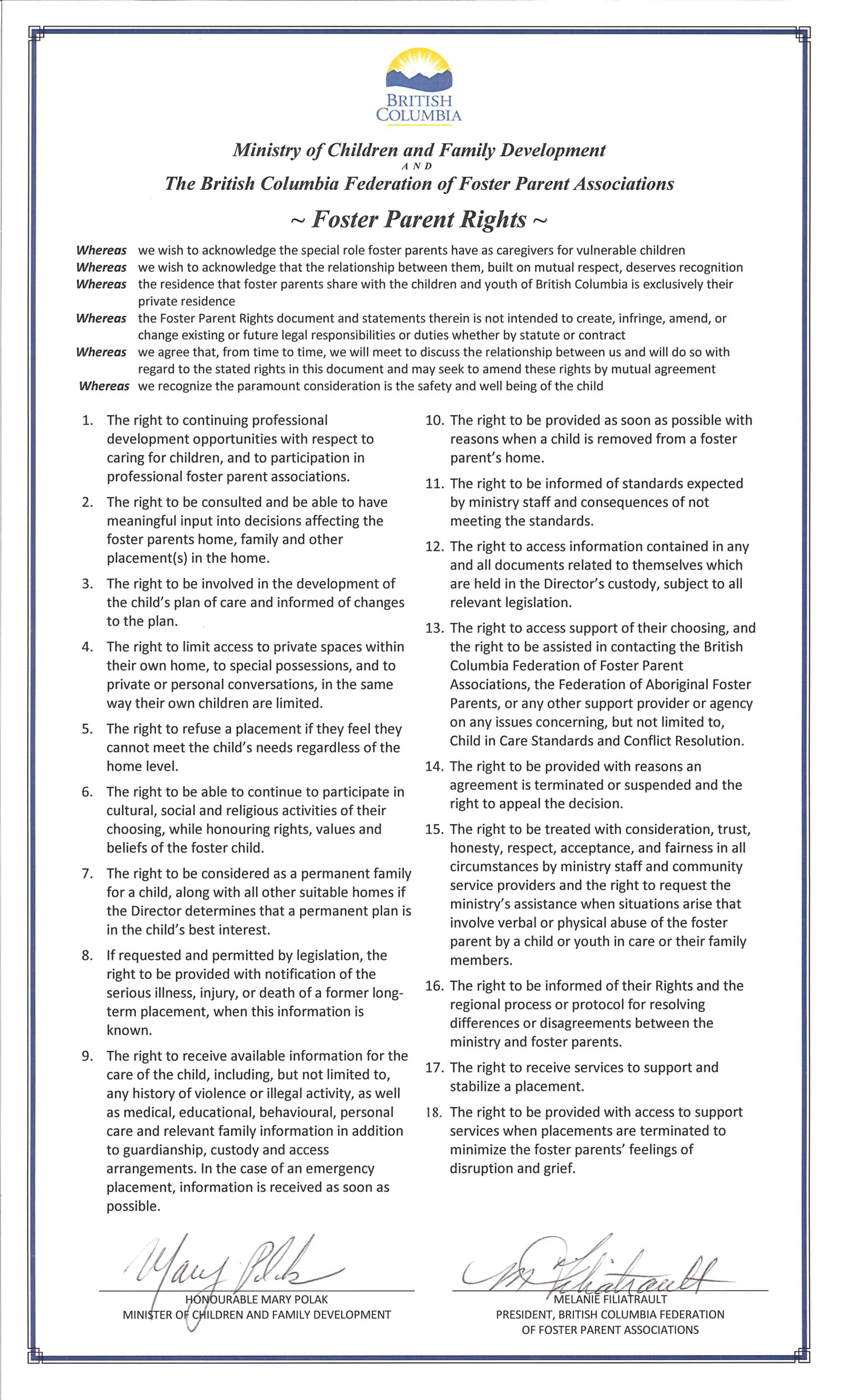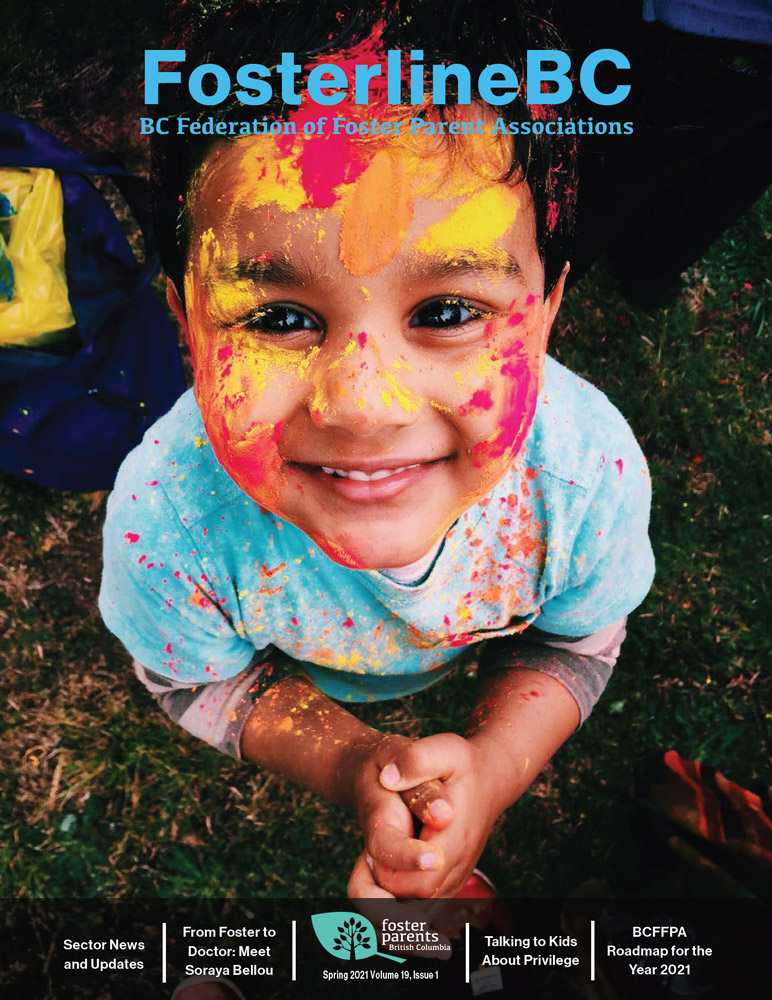Fostering Practice & Policies
Policies
As a foster parent, you have a multitude of important roles in a young person’s life. Primarily your role is to care lovingly, diligently and successfully for the children and youth placed in your care by a Ministry or agency team. You are charged with always considering their best interests. You are responsible for the day-to-day administrative documentation associated with your role as a temporary (although it may be long-term) foster caregiver for each of these young people. This involves, not only keeping track of appointments but writing monthly reports, submitting requests for services and for maintaining a log about the life of the child in your care. As a foster parent, you are a key member of a young person’s care team. You will be developing and maintaining relationships with workers and family members associated with the child or youth in your care.
These are a few of the reasons that it is imperative that you invest in the ongoing learning and understanding that is essential to being successful in the role of foster parent. There is a great deal to learn and the journey is rewarding!
If you have any questions, we’re only a phone call away:
If you’d like to know more, BC’s foster care practice is detailed in a few key documents:
Aboriginal Policy and Practice Framework in British Columbia
Child & Family Community Service Act
Children and Youth In Care Policies
Foster Parent Social Media Policy
Working with Indigenous Children, Youth, Families and Communities
Foster Parent Rights
Along with all of the responsibilities expected of a foster caregiver, foster parents have rights.
Income Tax Information
Paragraph 81(1) (h) of the Income Tax Act excludes certain social assistance payments from a recipient’s income. On April 26th, 1999 the Canada Customs and Revenue Agency published Income Tax Technical News No. 17, which clarified the position of the CCRA when social assistance payments are made through a non-profit organization to an individual who is responsible for a foster home.

Subclause 60(3) Income Tax Act 81(1) (h)
New paragraph 81 (1) (h) of the Act specifically exempts from income social assistance payment made to an individual for the benefit of a foster person (child or adult) under the individual’s care where the individual and the foster person reside together in the individual’s principal place of residence. The exemption also applies to amounts (often called “bed reservation fees” paid to individuals to maintain their residence available for use by a foster person. This amendment which clarifies the scope of previous amendments made to paragraph 56 (1) (u) of the Act applies to the 1982 and subsequent taxation years.
This describes how the income tax exemption applies to foster care providers. Section 81 of the Income Tax Act lists various amounts that are not included in computing a taxpayer’s income. In general, paragraph 81(1)(h) exempts from income social assistance payments to an individual caregiver (the “Caregiver”) for the benefit of a foster person (the “Cared-for individual”) under the Caregiver’s care. The Cared-for individual can be either a child or an adult. The income tax exemption applies to an amount received by the Caregiver when all of the following conditions apply:
- The payment is a social assistance payment ordinarily made on the basis of a means, needs, or income test.
- The payment is made under a program provided for by a federal, provincial or territorial law.
- The payment is received directly or indirectly by the Caregiver for the benefit of the Cared-for individual.
- The Cared-for individual is not the Caregiver’s spouse or common-law partner or related to the Caregiver or the Caregiver’s spouse or common-law partner.
- No family allowance under the Family Allowances Act or any similar allowance provided for by provincial or territorial law is payable in respect of the Cared-for individual for the period for which the social assistance payment is made.
- The Cared-for individual resides in the Caregiver’s principal place of residence, or the Caregiver’s principal place of residence is maintained for use as the Cared-for individual’s residence, during the period for which the payment is made.
Useful Links and Resources
There is a wealth of information available for foster parents. We have compiled some of the most useful resources in one spot.
Fosterline BC Newsletter
Each year, BCFPA produces three provincial newsletters for our community members that contain current news from across the province. We also include inspiring interviews with members of the fostering community as well as updated resources for foster caregivers.
Storage of Records
In 2007 the Federation forwarded a letter to Mark Sieben, then the Assistant Deputy Minister of Integrated Policy and Legislation for MCFD. The letter outlined our concerns with regard to the storage of CIC records and access to those records in their unaltered state by foster parents should legal issues arise subsequent to the placement’s completion. We also have to consider the legal rights of children and youth in care, as well as privacy issues pertaining to their records.
Learn more about reporting and documentation in our BC Foster Basics video:
Phone
Main:
604-544-1110
Toll-Free Foster Parent Line:
1-800-663-9999
Office hours: 8:30 am - 4:00 pm, Monday to Friday
PROVINCIAL CENTRALIZED SCREENING
Foster parents are encouraged to call this number in the event of an EMERGENCY or CRISIS occurring after regular office hours:
1-800-663-9122
REPORT CHILD ABUSE
If you think a child or youth under 19 years of age is being abused or neglected, you have the legal duty to report your concern to a child welfare worker. Phone 1-800-663-9122 at any time of the day or night. Visit the Government of BC website for more info.
address
BCFPA Provincial Office
Suite 208 - 20641 Logan Avenue
Langley, BC V3A 7R3
contact us
Fill out our contact form...

News
Site menu
Subscribe to Our Newsletter
Charitable Registration #
106778079 RR 0001
Our work takes place on the traditional and unceded Coast Salish territories of the Kwantlen, Katzie, Matsqui and Semiahmoo First Nations. BCFPA is committed to reconciliation with all Indigenous communities, and creating a space where we listen, learn and grow together.
© 2021 BC Foster Parents. Site design by Mighty Sparrow Design.

